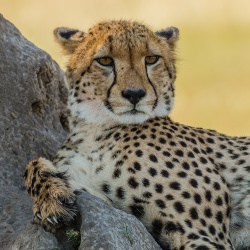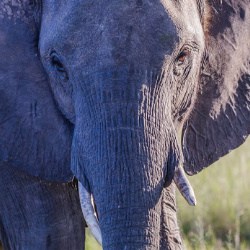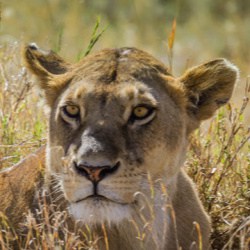The vast and beautiful Chobe National Park is found in the far north of Botswana, covering thousands of square kilometers of wild, rugged land that encompasses every conceivable habitat that can be found in Africa, from dry desert plains to rich and unique wetlands.
Chobe was Botswana’s first national park, and although it is no longer the largest in terms of area – two other national parks within the country are now geographically larger – it is most certainly the most biodiverse.
Within the boundaries of the national park are found hundreds of species of wildlife, including all of the famous Big Five safari animals; the lion, leopard, rhino, elephant, and buffalo.
In fact, due to incredible conservation efforts, Chobe NP boasts the largest number of elephants found anywhere on the African continent, numbering in the tens of thousands.
This really is one of the top places in Africa to visit on safari. It’s an experience like no other, and you are guaranteed to see more wildlife than anywhere else in Botswana or in Africa.
Don’t leave home without: Lonely Planet Africa (Travel Guide)
How to travel to Chobe National Park
Table of Contents
Chobe National Park is found stretching across a huge area of land in the northern region of Botswana, in Southern Africa. The park is geographically close to the borders with Zambia, Zimbabwe, and Namibia, and there are several ways to enter the park either from Botswana or from these neighboring countries.
The gateway to Chobe is the town of Kasane, which lies just across the border in Botswana on the beautiful, green banks of the Chobe River. Kasane can be reached by air from Botswana’s capital of Gaborone or internationally from Johannesburg in South Africa, from where there are plenty of daily flights further afield.
By paved road, Kasane can also be reached easily from parts of Botswana, including the capital as well as from nearby Victoria Falls, just across the border in Zimbabwe and itself another spectacular sight for tourists visiting this part of Africa to see.
Visitors may also find it easier to fly into Victoria Falls Airport and make their way overland to Chobe, a journey that should only take around 1 hour of travel time.
There are also ferry connections to Kasane from Zambia, along the wide river which flows between these two countries and serves as a crossroads of the African nations found in this region.
Kasane is the best place from which to explore Chobe National Park, and it’s here that you will find the best accommodation, facilities and tour opportunities and gain easy access to the more remote parts of the park too.
Best Time to visit Chobe National Park
The northern region of Botswana experiences distinct wet and dry seasons annually. The wet season runs roughly from November to April while the dry season runs from May to October. We traveled through Botswana in July and found the weather to be very beautiful. Warm during the day with clear skies at night.
The wet season can be extremely hot and humid and most tourists tend to avoid this time of the year. Flooding can close roads and insects are rampant. It tends to be quieter though, as most visitors will travel to Chobe during the dry season.
The dry season, however, really is the best time to go to see the majority of the wildlife in the park. The weather is nice and pleasant while the animals tend to be easier to find while on safari, as they will inevitably head towards the river in search of refreshment when other watering holes begin to dry up.
Don’t leave home without: Botswana (National Geographic Adventure Map)
Wildlife within the National Park
Chobe National Park is one of the best places in Africa to spot wildlife, purely because the number of species of animals to be seen is enormous. All of the Big Five are found here, however, due to poaching, it is very unlikely that you will spot a rhino while on safari, as unfortunately their numbers are so critically endangered.
As well as thousands of elephants, as well as healthy populations of lion, buffalo, and leopard, the waterways of the Chobe River, are full of Nile crocodiles and hippos, while across the park can be found everything from cheetahs and giraffe to hyena and zebra.
Chobe holds a microcosm of African wildlife, and there are few other places on the continent where you will be able to experience such an array of nature in one place.
Within the boundaries of the national park, the ecosystems are divided into three major areas that can be visited, and one arid desert-like strip of land that few people will see. These main three areas function as separate tourist areas, each with their own unique array of wildlife and different reasons for visiting.
Our top recommended tours:
- G Adventures The Great Southern Africa Safari
- G Adventures Southern Africa Safari Adventure
- G Adventures Zimbabwe and Botswana Safari
- G Adventures Wildlife and Wonders of Southern Africa
The Chobe Riverfront
The Chobe Riverfront is the area of land that stretches along the border of Botswana from the main northern gateway of Kasane. This is where most tourists will find themselves either based or branching out from, as it’s the easiest place in the park to spot the maximum number of animal species, and especially the predators and larger wildlife that many come here specifically to see.
The Chobe River offers a hugely diverse wetland, were both predators and prey congregate to feed, water and hunt. In the dry season, it’s even busier along the river, as animals migrate here in search of food and water from much further afield.
Along the river that it’s possible to see herds of elephant numbering in the hundreds.
From Kasane, tour operators take travelers out for game drives and safaris along the river. The best time of day to head out into the wild is either early morning or late afternoon, just before the sunset when the animals are at their most active.
From Kasane, it’s also possible to conduct a self-drive safari, as long as you have your own four-wheel-drive vehicle, as the game tracks are incredibly well marked and very easy to follow.
We went on two safaris in Chobe National Park, both by the river. These safaris operate on pontoon type boats that are slow-moving and very quiet. The boats have large, flat decks that are easy to move around on and provide a great platform for wildlife viewing and photography.
We were able to see large herds of elephants both on the bank and in the river, herds of giraffe grazing, zebras, cape buffalo, hippos in the water and a large variety of birds.
Where to stay to visit the Chobe Riverfront
As already stated, Kasane is the best base of operations for really experiencing the Chobe Riverfront. There’s a real mix of styles and budget ranges available, making it the perfect location for most travelers looking for a short trip to the national park.
In the town itself, are several basic guesthouses catering to more budget-minded travelers, although there isn’t much available for backpackers, except for the chance to camp out here and there.
Closer to the river itself, can be found more upmarket, luxurious and unique accommodation options. Many of these are lodge style, organizing tours and safaris and providing luxury features such as swimming pools.
Recommended Lodging Options:
Read reviews and check prices for hotels in Botswana on our Hotel Search Engine
Savuti
Savuti lies further in the interior of Chobe National Park and it’s the place to visit to experience the real diversity of landscapes that can be found here.
This area is where the desert meets the grasslands, with vast arid landscapes stretching for hundreds of kilometers merging with marshes and wetlands near the rivers. It’s an incredible place to view wildlife because of their abundance in this area.
Due to the mixture of arid land and dense, verdant watering holes, when the dry season is in full swing many animals are found migrating across the land here, moving from desert to greenery.
For that reason, the safari opportunities and the chance to see the animals in a remote and unique landscape during the dry season are exceptional.
Where to stay to visit Savuti
Savuti is not easy to get to. It’s a long way from Kasane and can only be accessed safely by four by four during the dry season. For this reason, accommodation is limited here, and either comes in the form of basic bush camps or luxury game lodges.
Our Recommended Lodging Options:
Read reviews and check prices for hotels in Savuti on our Hotel Search Engine
Linyanti Wetlands
The Linyanti Wetlands are an incredibly remote area of marshes that straddle the border with Namibia in the north west of Chobe National Park.
The area is rich in wildlife, but is especially well regarded as a prime location for spotting the rare African Wild Dog, an elusive canine that is found in large numbers in the region.
This isolated area can become completely cut off during the wet season, so the only time to reach this area is during the dry season. A four by four is a must, as there are no paved roads and even less gravel roads stretching this far into the park.
Many areas of this part of the park have been divided into private areas and lodges and some may even fly you in on light aircraft to avoid the bumpy ride overland.
These bush camps are for the most part, not the basic camp you may be imaging, but rather are luxury safari camps catering to high end visitors and organizing daily sightseeing activities too.
It’s imperative to book in advance, as space in these remote camps is always limited. There’s usually a minimum stay of a few nights required.
Health and Safety
Chobe National Park is an outstanding safari location, however, with such a variety of animals and wildlife, there is always a risk of danger when it comes to viewing them. It’s best to take the side of caution and to travel with a guide or on an organized safari if you are inexperienced or new to this part of the world.
Conditions can be unpredictable, as can the animals. While there are several camping spots within the park, it’s also very much advised not to free camp, especially without a knowledgeable local guide, as fatalities in the bush can occur.
Botswana is located in a malarial zone, so it is strongly advised that you consult a physician and bring malaria pills with you while you are traveling in Botswana. There are a number of different options available depending on the areas of Africa you will visit.
We traveled for 4 months through Africa on Malarone – Atovaquone, as it boasts minimal side effects and is highly effective in preventing Malaria.
Measures should be taken to reduce your exposure and risk to mosquito bites though, as it is not the only malaria you have to worry about. Dengue Fever is highly possible and not something you can take a medication to prevent. Dengue carrying mosquitos move around at dusk, so keep yourself covered and use high deet repellent to protect yourself from being bitten.
| Recommended Tours | ||
|---|---|---|
 |  |  |
 |  |  |
| Tanzania Safari 7 days Nairobi to Arusha Trip Type: Small Group 12 - 15 People | Masai & Tanzania Safari 10 days Nairobi to Arusha Trip Type: Small Group 12 - 15 People | Serengeti & Ngorongoro Crater Safari 4 days Arusha to Arusha Trip Type: Small Group 12 - 15 People |
| Check Price | Check Price | Check Price |
More on Botswana:
- 7 Reasons Botswana Tourism is on the Rise
- Elephant Sands Camping Adventure in Botswana
- Bush Camping in the Okavango Delta in Botswana
- 25 Epic Places to Have the Best Safari in Africa
- African Safari Animals and Where to Find Them
- 25 Photos That Will Make You Want To Visit Africa
- Ultimate Vaccination Guide for Africa Travel
- Oasis Overland Trip Through Africa: What to Expect
- Africa Overland Trip Budget: Oasis Overland
- Ultimate Travel Photography Gear List
- Photography Gear Every Adventure Traveler Should Carry









